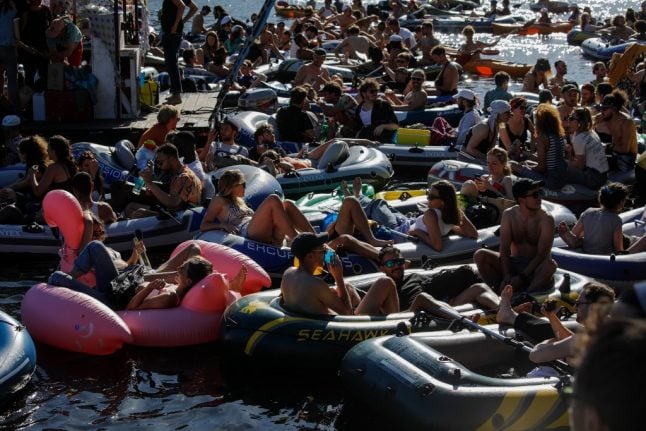Around 1,500 people (police estimates) gathered at Berlin’s Landwehr Canal on Sunday, lining the banks and filling the body of water with yachts, canoes and small inflatable boats.
The event was organised by club collective Rebellion der Träumer to support Berlin’s hard hit nightclubs, who have been unable to open their doors since the Covid-19 health crisis began.
“So that it doesn’t turn into a 'superspreader' event, we would like to ask you to take face masks with you and to keep your distance,” the group wrote on their event post on Facebook .
But photos published by news agency AFP and other local media sources show that the public didn’t exactly adhere to these social distancing precautions.
READ ALSO: 'United we stream': How Berlin's clubs are coming together to survive the corona crisis

A sea of people cramped into the packed canal partying with music and alcohol, but not many face masks at all.

“The risks should not be underestimated,” German Chancellor Angela Merkel warned on Saturday, fearing that the population would drop its guard too early as the country's lockdown was eased.
“Some people now believe that because the great mass suffering did not occur, the danger was probably never so great. What a mistake! A look at our neighbouring countries that have been so much harder hit shows what could have happened easily”.

In a statement on Facebook, Rebellion der Träumer said it was calling for a serious debate on how to support those suffering from the coronavirus crisis, highlighting that more support for clubs and festivals, as well as self-employed artists was needed.
“As cultural workers our professional existence and our venues are acutely threatened – many artists, cultural institutions and festivals are falling through all the nets,” it said in the post.
The group, which said the demonstration was organised with an alliance of different initiatives and clubs, said it had chosen to host the event on water “in order to minimize the risk of infection as much as possible”.
Rebellion der Träumer said it was overwhelmed by the support but apologised for the scale of the event and that the protest ended outside a hospital.
In a Facebook post, the group said “we did our best in various ways to make the demo as safe as possible”, adding that it had urged people to only go on rubber dinghies with housemates or partners, and to stick to safety measures.



 Please whitelist us to continue reading.
Please whitelist us to continue reading.
Interesting notion to expect any hygiene measures from an average clubber, seeing what goes on in club toilets 😀